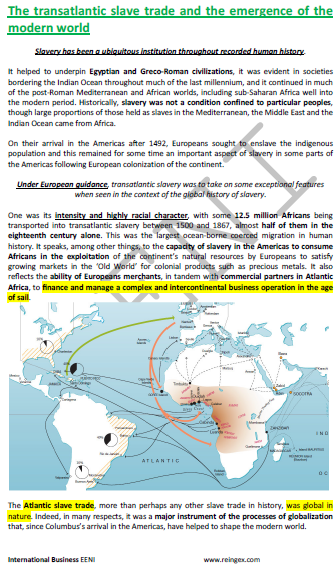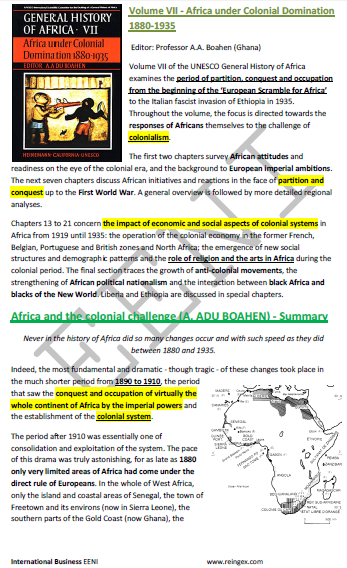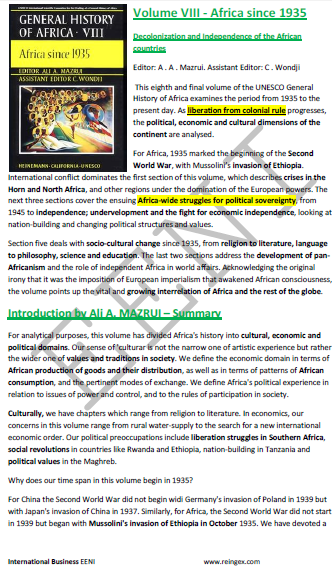History of the World Economy

History of the World Economy. Geography of the World
| Bachelor of Science in International Trade |

The Subject “History of the World Economy” consists of eight units:
Unit 1. Introduction to the History of the World Economy
- Key concepts to understand the economy and its evolution
Unit 2. Antiquity
- Prehistory
- Ancient Age. Ancient Civilizations
Unit 3. The Middle Age
- Fall of the Roman Empire
- Feudalism
- Expansion of Islam
- The Non-Western economies
Unit 4. The Modern Age
- Age of discovery. Overseas expansion
- Commercial routes
- Case study: the Transatlantic slave trade as the first economic system of the Globalization
- Economic nationalism and imperialism
Unit 5. Contemporary Age
- Industrial revolution, spread of industrialization and economic globalization in the nineteenth century
- The first industrialized countries
- Other countries with further industrialization
- Resurgence of the Western imperialism
- War, Depression and DeGlobalization, 1914-1950
Unit 6. Reconstruction of the world Economy
- Growth of the world economy 1950-1973
- Decolonization
- World economy since 1973: from the oil crisis to the new Globalization
Unit 7. 21st century
- Current global economy
- Trends towards the regionalism
- Current economic blocks
Unit 8. Geography of the World. Profile of the World Countries:
- African continent
- European continent
- Asian continent
- American continent
- Oceania
See also: History of Africa.
- Methodology and African Prehistory
- Ancient African Civilizations
- Africa from 7th to 11th century
- Africa from 12th to 16th Century
- Africa from 16th to 18th Century
- Africa in the 19th century until 1880
- Africa under Colonial Domination, 1880-1935
- Africa since 1935. The Independence of the African Countries
The objectives of the subject “History of the World Economy” are the following:
- To know the world economy evolution, its growth, structural changes and Internationalization
- To analyze the changes in production and distribution, institutions and in the international economic order
- To familiarise the student with the world political division
- To analyze the states, their location, population, languages and other criteria that help to understand the possibilities of doing business in the global market
Knowledge Area: International Trade. History of the World Economy History of the World Economy. To understand the current economic development, it is necessary to analyze how the economy has evolved throughout history. This analysis will allow us to see what problems have existed throughout the history of the world economy, the solutions proposed and the result obtained. Currently, there are poor, rich, developed, emerging countries, BRICS countries (Brazil, Russia, India, China and South Africa), etc. However, they have not always been the same protagonists in the world economy. The situation of the twenty-first century is very different from that of the sixteenth century or that of the fifth century. Which countries dominated the international trade in an earlier era and why now it is others? How have crises occurred and how has the economy recovered? To trade, you need to have products and services to trade. How and where did international trade begin? Technology has dramatically influenced commerce. From the first exchanges of agricultural products, we have come to trade all over the world all kinds of products and services thanks to information technologies. However, international trade has not always been easy. There have been governments with open policies while others have established protectionist measures. History, therefore, allows us to understand how we have arrived at the current situation and perhaps to imagine where we are going. There are physical and political boundaries in the world. The organization of the territory of the countries sometimes does not correspond to the real physical limits, and even sometimes influence more than political borders. Anyone wishing to start in international business must know the political, economic and geographical division of the world.
(c) EENI Global Business School (1995-2025)
|










 WhatsApp
WhatsApp or
or 





